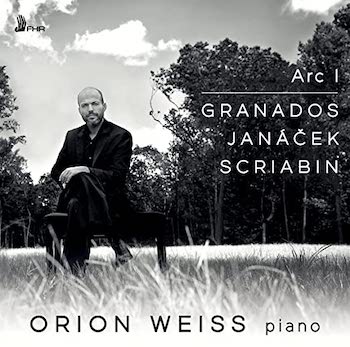Classical Album Review: Orion Weiss’s “Arc 1” — Crafting a Strong Sense of Impending Doom
By Jonathan Blumhofer
The album serves up exceptional stuff, even if the program’s a touch macabre and pianist Orion Weiss’s well-written liner notes make uncomfortable connections between the world of pre-World War 1 Europe and our own pandemic-riddled age.
 The idea that artists have some unique insights into future events is an old one – Gustav Mahler, for one, held to it – and, whether or not one accepts it, the notion can fire some interesting programs. That’s certainly the case with pianist Orion Weiss’s Arc 1, the first installment of a three-part series charting the fall and rise (broadly speaking) of Western society during the 20th century by way a wide selection of keyboard repertoire from those decades.
The idea that artists have some unique insights into future events is an old one – Gustav Mahler, for one, held to it – and, whether or not one accepts it, the notion can fire some interesting programs. That’s certainly the case with pianist Orion Weiss’s Arc 1, the first installment of a three-part series charting the fall and rise (broadly speaking) of Western society during the 20th century by way a wide selection of keyboard repertoire from those decades.
To my ears, this volume, which centers on music written just before the start of World War 1, doesn’t quite convince of the psychic powers of Enrique Granados, Leoš Janáček, and Alexander Scriabin (I’m dubious of the phenomenon, generally). But, in hindsight at least, their collective focus on death and the occult in these works certainly crafts a strong sense of impending doom.
Granados was, in fact, to die during the War: he and his wife drowned after their ferry was torpedoed in the English Channel by a U-boat in 1916. To suggest that Goyescas, his extraordinary, fifty-minute-long piano suite from 1911, anticipates such an end is, perhaps, a bit generous: true, the concluding “Serenade of the Ghost” ends with Death triumphant, but, in the context, the application seems more universal than specific.
Regardless, Weiss has an exceptional grasp of what makes this piece compelling – and it’s not just the pages of bravura writing. True, those are dispatched here with astonishing clarity: every movement, from the spirited, dancing “Flattery” to the affecting “Laments” and closing “Serenade” is lucidly framed. The exchanges of materials between the hands are always flawless. Despite the music’s frequent dense episodes, all the parts speak – Weiss isn’t a pianist to hide behind his pedal, after all.
His feel for the music’s expressive crux is likewise evident in each of the six movements. All of them flow naturally. Phrasing is often flexible, but always serves a larger point, be that the contrasts of tenderness and driving force in the “Conversation at the Window” or the gently seductive rhythms of the “Fandango by Candlelight.”
Weiss’s ear for color, too, impresses. The misterioso sections of the “Fandango,” for instance, are beguilingly shaped. So are the haunting echoes of previous themes in the penultimate “Ballada.” For their part, the finale’s dry articulations are shatteringly droll.
Coming after this, Janáček’s In the Mists provides a mighty contrast. The dreamy textures of its first three movements are countered by moments of explosive urgency, especially in the Andantino’s fervent “Poco mosso” section. Weiss imbues the finale with a strong degree of drive and purpose. The result is a strongly-connected reading that unfolds naturally – no small accomplishment given the movement’s fragmentary nature.

Pianist Orion Weiss
After this, Scriabin’s Piano Sonata No. 9 functions as something of a weird nightcap. Composed in 1913 and subtitled “Black Mass” (not the composer’s designation, but he approved of it), it is, like much of Scriabin’s late music (he died in 1915), highly chromatic and wildly virtuosic.
The piece holds no terrors, though, for Weiss (at least not of the technical or interpretive varieties). He dispatches its murky, unsettled opening section with impressive clarity and feeling. The serene second theme, though it’s so easily enfolded into the music’s nefarious textures, always stands out in his playing. Throughout, the transformations of motivic ideas come out logically, and, as in each of the earlier selections, balances, even thematic exchanges, and textural clarity are all at the forefront of the pianist’s interpretation.
It’s exceptional stuff, even if the program’s a touch macabre and Weiss’s well-written liner notes make uncomfortable connections between the world of pre-World War 1 Europe and our own pandemic-riddled age. The bad news: 1914 was just one stop on the way to the pit of the abyss. The good news: we can still write our own future. At least album makes one hope so.
Jonathan Blumhofer is a composer and violist who has been active in the greater Boston area since 2004. His music has received numerous awards and been performed by various ensembles, including the American Composers Orchestra, Kiev Philharmonic, Camerata Chicago, Xanthos Ensemble, and Juventas New Music Group. Since receiving his doctorate from Boston University in 2010, Jon has taught at Clark University, Worcester Polytechnic Institute, and online for the University of Phoenix, in addition to writing music criticism for the Worcester Telegram & Gazette.
